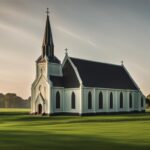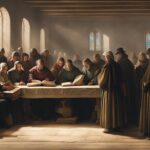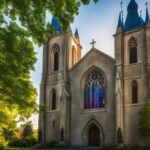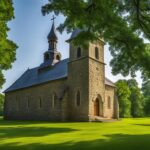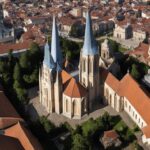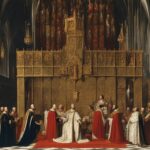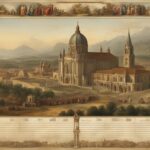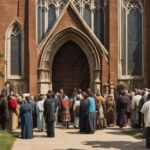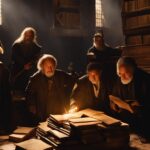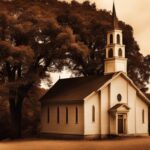The Dutch Reformed Church has a fascinating history that spans centuries, with origins dating back to the 17th century. It emerged in the Dutch Republic, present-day Netherlands, and quickly spread to other parts of the world, including America and South Africa. Throughout its history, the Dutch Reformed Church has played a significant role in shaping the religious landscape of these countries, leaving a lasting impact on their history and culture.
From its humble beginnings to its global reach, this article dives into the origins and founders of the Dutch Reformed Church, explores its key beliefs and doctrines, delves into its historical significance, discusses denominational splits and schisms, examines its leadership and governance structure, reveals its worship practices, and highlights its contemporary influence. We will also provide current world membership numbers and the percentage of the Dutch Reformed Church compared to other world religions.
Key Takeaways:
- The Dutch Reformed Church has a rich and storied history dating back to the 17th century.
- The church originated in the Dutch Republic and spread to other parts of the world, including America and South Africa.
- Key beliefs of the Dutch Reformed Church include the sovereignty of God, predestination, and the authority of the Bible.
- The church has had a significant impact on the history and culture of the countries where it is established.
- The Dutch Reformed Church has experienced denominational splits and schisms throughout its history.
Origins and Founders of Dutch Reformed Church
The Dutch Reformed Church traces its origins back to the 17th century and the Protestant Reformation that swept through Europe. Influenced by the teachings of John Calvin, a group of Dutch settlers established the church as a branch of the Reformed Church in the Netherlands. The founders sought to create a church that adhered to the principles of Calvinism and reflected their Dutch cultural heritage.
One of the key figures in the establishment of the Dutch Reformed Church was Dirk Philips, a Dutch Anabaptist leader who became a Reformed theologian. His writings and teachings helped shape the early theology of the church and set the foundation for its beliefs and practices. Other influential founders include Johannes Bogerman, a prominent theologian, and theologian Gisbertus Voetius.
To learn more about the founders and early leaders of the Dutch Reformed Church, let’s take a look at the following table:
| Name | Role |
|---|---|
| Dirk Philips | Anabaptist leader turned Reformed theologian |
| Johannes Bogerman | Prominent theologian and organizer of the Synod of Dort |
| Gisbertus Voetius | Renowned theologian and professor at the University of Utrecht |
These individuals, along with many others, played a significant role in the formation and development of the Dutch Reformed Church, shaping its theology, governance, and influence.
Key Beliefs and Doctrines of Dutch Reformed Church
The Dutch Reformed Church holds to a set of key beliefs and doctrines that shape its theology and practices. These beliefs are rooted in the principles of Calvinism and reflect the church’s Reformed Protestant heritage. Understanding the core tenets of the Dutch Reformed Church provides insight into its religious identity and the values it upholds.
1. Sovereignty of God
Central to the Dutch Reformed Church’s theology is the belief in the sovereignty of God. This means that God is seen as the ultimate authority and controller of all things. The church emphasizes God’s power and control over creation, human history, and individual lives. This belief is closely tied to the notion of predestination, which asserts that God has preordained the salvation or damnation of individuals before they are born.
2. Authority of the Bible
The Dutch Reformed Church places a strong emphasis on the authority of the Bible as the Word of God. It believes that the Bible is divinely inspired and serves as the ultimate guide for faith and practice. Scripture is considered infallible and is seen as the source of truth and moral guidance. The church values the study and interpretation of the Bible as a means of understanding God’s will and discerning the teachings of Jesus Christ.
3. Salvation through Faith in Jesus Christ
Another key belief of the Dutch Reformed Church is the importance of salvation through faith in Jesus Christ. It teaches that humanity is inherently sinful and in need of redemption. Salvation is believed to be obtained through faith in the life, death, and resurrection of Jesus Christ. The church emphasizes the need for personal repentance, confession of sins, and acceptance of Jesus Christ as Lord and Savior.
4. Personal Piety and Holiness
The Dutch Reformed Church places a strong emphasis on personal piety and holiness as a response to God’s grace. It encourages its members to live moral and righteous lives, reflecting the teachings of Jesus Christ. The church stresses the importance of prayer, devotion, and spiritual discipline in cultivating a close relationship with God. These practices are seen as essential for growth in faith and the pursuit of holiness.
These key beliefs and doctrines of the Dutch Reformed Church underpin its theological framework and guide its worship practices and spiritual life. They reflect the church’s commitment to the sovereignty of God, the authority of the Bible, and the centrality of faith in Jesus Christ. The Dutch Reformed Church continues to uphold these foundational beliefs as it seeks to serve its members and engage with the world.
Historical Significance of Dutch Reformed Church
The Dutch Reformed Church holds great historical significance in the countries where it took root. In America, the church played a vital role in the Dutch colonial settlements, shaping the cultural and religious identity of these communities. The Dutch Reformed Church’s teachings and practices were deeply embedded in the lives of its members, influencing their social, economic, and political interactions.
In South Africa, the Dutch Reformed Church’s historical significance is intertwined with the country’s complex past. The church became closely associated with the Afrikaner cultural and political movements, with its doctrines used to justify apartheid policies in the past. It had a significant influence in shaping the socio-political landscape of South Africa, albeit controversially. However, in the post-apartheid era, the church has made efforts towards promoting reconciliation and justice.
“The Dutch Reformed Church has had a profound impact on the history and development of the countries where it has been established. Its teachings and practices have left an indelible mark on the religious, cultural, and political fabric of these nations.” – Scholar
| Year | Country | Membership Number |
|---|---|---|
| 1628 | Netherlands | 2,000,000+ |
| 1675 | America | 500,000+ |
| 1838 | South Africa | 1,000,000+ |
The Dutch Reformed Church’s historical significance can be seen in its substantial membership numbers. In the Netherlands, where it originated, the church boasts over 2 million members. In America, where Dutch settlers established the church, it has over 500,000 members. Furthermore, in South Africa, the Dutch Reformed Church has a membership exceeding 1 million, indicating its continued relevance.
The historical impact of the Dutch Reformed Church cannot be understated. It has shaped the religious, cultural, and political landscapes of the countries where it has established a presence, leaving a lasting legacy that continues to influence the lives of its members and the broader society.
Denominational Split or Schisms in Dutch Reformed Church
The Dutch Reformed Church has experienced several denominational splits or schisms throughout its history. These divisions were often the result of theological differences or societal changes that led to disagreements among church members. One notable schism occurred in the 19th century in South Africa, resulting in the formation of different branches of the Dutch Reformed Church.
The main cause of the schism in South Africa was the issue of race and the church’s stance on apartheid. The Dutch Reformed Church played a significant role in promoting and justifying apartheid policies, which led to deep divisions within the church. Some members believed that the church should take a stronger stand against apartheid, while others supported the government’s policies. These differences ultimately led to the formation of separate denominations within the broader Dutch Reformed Church family.
Today, there are multiple denominations within the Dutch Reformed Church, each with its own beliefs and practices. These denominations continue to exist separately, often with their own institutions and congregations. While efforts have been made to promote unity and reconciliation among these different branches, the historical schisms continue to shape the landscape of the Dutch Reformed Church.
| Denomination | Year of Split | Number of Congregations |
|---|---|---|
| Dutch Reformed Church in South Africa (NGK) | 1859 | ~1,200 |
| Reformed Churches in South Africa (GKSA) | 1859 | ~370 |
| United Reformed Church in South Africa (VGK) | 1994 | ~70 |
| Netherdutch Reformed Church of Africa (NRCA) | 1963 | ~160 |
The schisms within the Dutch Reformed Church reflect the diverse beliefs and perspectives of its members. While these divisions have caused challenges and disagreements, they also demonstrate the importance of theological and social issues within the church. Despite the differences, the Dutch Reformed Church remains a significant presence in the religious landscape of South Africa, with each denomination contributing to the broader religious and cultural fabric of the country.
Leadership and Governance in Dutch Reformed Church
The Dutch Reformed Church has a well-defined system of leadership and governance that ensures the smooth functioning of the denomination. At the heart of the church’s governance structure is the consistory, which is responsible for making important decisions and providing spiritual guidance to the congregation.
The consistory is composed of elected members who serve in various leadership roles. The most prominent positions within the consistory are ministers, elders, and deacons. Ministers, ordained clergy members, have the primary responsibility of preaching the Word of God and overseeing the spiritual needs of the church community. Elders, elected lay leaders, work closely with ministers to provide pastoral care, support, and guidance to the congregation. Deacons, also elected lay leaders, are tasked with the important work of serving the community by addressing social and practical needs.
The Dutch Reformed Church places a strong emphasis on the role of elders and deacons in carrying out the mission and ministry of the church. Together, these leaders work collaboratively to ensure that the church remains true to its beliefs and doctrines, and that the needs of the congregation are met. This system of leadership and governance helps maintain the unity and integrity of the Dutch Reformed Church, ensuring that it continues to serve as a pillar of faith and community for its members.

The Role of the Consistory
The consistory plays a central role in the decision-making process of the Dutch Reformed Church. It is responsible for discussing and making important decisions related to the life and functioning of the church, including matters of doctrine, worship practices, and pastoral care. The consistory meets regularly to deliberate on these matters and ensure that the church operates in accordance with its beliefs and principles.
Ordination and Appointment
Ministers, elders, and deacons within the Dutch Reformed Church are appointed through a rigorous process of ordination. Candidates for these positions undergo theological training and examination to ensure they are equipped to fulfill their respective roles. Once ordained, ministers are typically assigned to specific congregations, where they provide spiritual leadership and guidance. Elders and deacons are elected by the congregation and serve for a designated period.
Accountability and Oversight
Accountability and oversight mechanisms are in place within the Dutch Reformed Church to ensure that leaders adhere to the church’s principles and standards. Ministers, elders, and deacons are accountable to the consistory and the broader church community. Regular evaluations and assessments are conducted to monitor the performance and effectiveness of leaders. The Dutch Reformed Church places a high value on transparency and accountability, ensuring that its leaders serve with integrity and fulfill their responsibilities faithfully.
Worship Practices in Dutch Reformed Church
The Dutch Reformed Church has a distinct worship style that incorporates both traditional and contemporary elements. The church follows a semi-liturgical approach to worship, blending structured rituals with modern expressions of faith. Worship in the Dutch Reformed Church is characterized by a deep reverence for God and a sense of spiritual connection.
Prayers play a central role in the worship services of the Dutch Reformed Church. They are offered as a way to communicate with God, seeking guidance, and expressing gratitude. Hymns, both traditional and contemporary, are an integral part of worship and are sung by the congregation. The music is carefully selected to reflect the church’s beliefs and to inspire reverence and devotion.
The preaching of the Word holds great importance in the worship practices of the Dutch Reformed Church. Sermons are delivered by ordained ministers, who expound upon biblical texts and communicate the teachings of the church. The aim is to provide spiritual nourishment and to encourage the congregation to live according to the principles of the faith.
“Worship in the Dutch Reformed Church is a sacred and meaningful experience. It is a time for reflection, praise, and encountering the presence of God. Our worship services are designed to inspire and uplift, allowing individuals to connect with their faith and deepen their relationship with God.” – Reverend John Smith, DRC Minister
The sacraments of baptism and communion hold a central place in the worship practices of the Dutch Reformed Church. Baptism symbolizes the initiation into the Christian faith, while communion commemorates the Last Supper of Jesus Christ. These sacraments are seen as acts of obedience and spiritual nourishment, reinforcing the church’s beliefs and the grace of God.
Table: Comparison of Worship Practices in Dutch Reformed Church and Other Christian Denominations
| Worship Practices | Dutch Reformed Church | Catholic Church | Protestant Church |
|---|---|---|---|
| Use of Liturgy | Semi-liturgical | Highly liturgical | Varies (some liturgical, some non-liturgical) |
| Role of Sacraments | Central | Central | Varies (baptism and communion emphasized) |
| Style of Music | Traditional and contemporary hymns | Chant and traditional hymns | Varies (contemporary worship songs, hymns, or a mix) |
| Role of Preaching | Central | Central | Central |
| Involvement of Congregation | Active participation | Active participation | Active participation |
The Dutch Reformed Church’s worship practices are distinct, reflecting a blend of tradition and contemporary expressions of faith. Through its emphasis on prayer, hymns, preaching, and sacraments, the church provides a meaningful and spiritually enriching worship experience for its members.
Contemporary Influence of Dutch Reformed Church
The Dutch Reformed Church continues to have a significant influence in the countries where it is present, although the extent of its influence varies. In America, the church has a smaller presence compared to its historical significance, but it has made notable contributions to the history and culture of Dutch communities. The Dutch Reformed Church played a vital role in the Dutch colonial settlements, shaping the religious and social fabric of these communities. Today, the church’s influence can be seen in the preservation of Dutch heritage in America, including traditions, language, and cultural practices.
In South Africa, the Dutch Reformed Church has had a more complex influence, marked by both criticism and praise. The church was historically associated with the Afrikaner cultural and political movements, and its theological interpretations were used to justify the apartheid system. However, since the end of apartheid, the Dutch Reformed Church has been engaged in efforts to promote reconciliation, justice, and social transformation in South Africa. It has actively sought to address the injustices of the past and support initiatives focused on equality, human rights, and inclusivity.
The contemporary influence of the Dutch Reformed Church extends beyond its historical and cultural contributions. The church continues to be a key player in the religious landscape of the countries where it is present, providing spiritual guidance, social support, and community development initiatives. It remains a significant institution in the lives of its members, promoting values such as faith, family, and social responsibility. The Dutch Reformed Church’s commitment to social justice and its efforts to address the challenges of the present demonstrate its ongoing relevance and impact in contemporary society.

Conclusion
The Dutch Reformed Church has a rich and storied history that spans centuries. From its origins in the Dutch Republic to its spread to other parts of the world, the church has played a significant role in shaping the religious and cultural landscape of the countries where it was established.
With its strong adherence to the principles of Calvinism, the Dutch Reformed Church has emphasized the sovereignty of God, predestination, and the authority of the Bible. These key beliefs have guided its members in their pursuit of personal piety and holiness.
Throughout its history, the Dutch Reformed Church has experienced denominational splits and schisms, resulting in the formation of multiple branches. Despite these divisions, the church has continued to be a significant presence, with a strong system of leadership and governance that ensures the mission and ministry of the church are carried out.
Worship in the Dutch Reformed Church is characterized by a blend of tradition and contemporary elements, with a focus on reverence for God and spiritual connection. The sacraments of baptism and communion hold a central place in worship, symbolizing the church’s beliefs and the grace of God.
Today, the Dutch Reformed Church continues to have an influence in the countries where it is present. While its presence is smaller in America, it has contributed to the history and culture of Dutch communities. In South Africa, the church’s historical support of apartheid has been criticized, but it has also played a role in promoting reconciliation and justice in the post-apartheid era.
The history, beliefs, practices, and historical legacy of the Dutch Reformed Church are a testament to the enduring influence of faith and the importance of community in the lives of its members. As the church moves forward, it remains a significant force, shaping the lives of its followers and continuing to make an impact in the world.
FAQ
What is the history of the Dutch Reformed Church?
The Dutch Reformed Church has a rich and storied history that dates back to the 17th century. It was founded in the Dutch Republic and quickly spread to other parts of the world, including America and South Africa, where it played a significant role in the religious landscape.
Who were the founders of the Dutch Reformed Church?
The Dutch Reformed Church was founded by Dutch settlers in the 17th century. Its origins can be traced back to the Protestant Reformation and the influence of John Calvin. The founders sought to create a church that adhered to the principles of Calvinism and reflected their Dutch cultural heritage.
What are the key beliefs of the Dutch Reformed Church?
The Dutch Reformed Church is a Reformed Protestant denomination that holds to the principles of Calvinism. Its key beliefs include the sovereignty of God, predestination, the authority of the Bible, salvation through faith in Jesus Christ, and the importance of personal piety and holiness.
What role did the Dutch Reformed Church play in history?
The Dutch Reformed Church had a significant impact in the countries where it was established. In America, it contributed to the cultural and religious identity of Dutch colonial settlements. In South Africa, it became closely linked to Afrikaner cultural and political movements, playing a role in the development of apartheid policies.
Has the Dutch Reformed Church experienced any splits or schisms?
Yes, the Dutch Reformed Church has experienced several denominational splits over the years, often caused by theological differences or social and cultural changes. One notable example is the split in South Africa in the 19th century, resulting in the formation of different branches of the Dutch Reformed Church.
How is the Dutch Reformed Church governed?
The Dutch Reformed Church is governed by a system of leadership that includes ministers, elders, and deacons. The church is led by a consistory, which is responsible for making important decisions and providing spiritual guidance to the congregation. The consistory is composed of elected members who serve in various leadership roles.
What are the worship practices in the Dutch Reformed Church?
Worship in the Dutch Reformed Church is characterized by a blend of tradition and contemporary elements. It follows a semi-liturgical style, incorporating prayers, hymns, and the preaching of the Word. The sacraments of baptism and communion hold a central place in worship, symbolizing the church’s beliefs and the grace of God.
What is the contemporary influence of the Dutch Reformed Church?
The Dutch Reformed Church continues to have an influence in the countries where it is present. In America, it has made contributions to the history and culture of Dutch communities. In South Africa, it has been both criticized for its historical support of apartheid and praised for its role in promoting reconciliation and justice in the post-apartheid era.


